The Russian president’s time in Pyongyang and Hanoi gave clear evidence of the turn away from the West that Lavrov, the country’s foreign minister, announced at the start of the year.
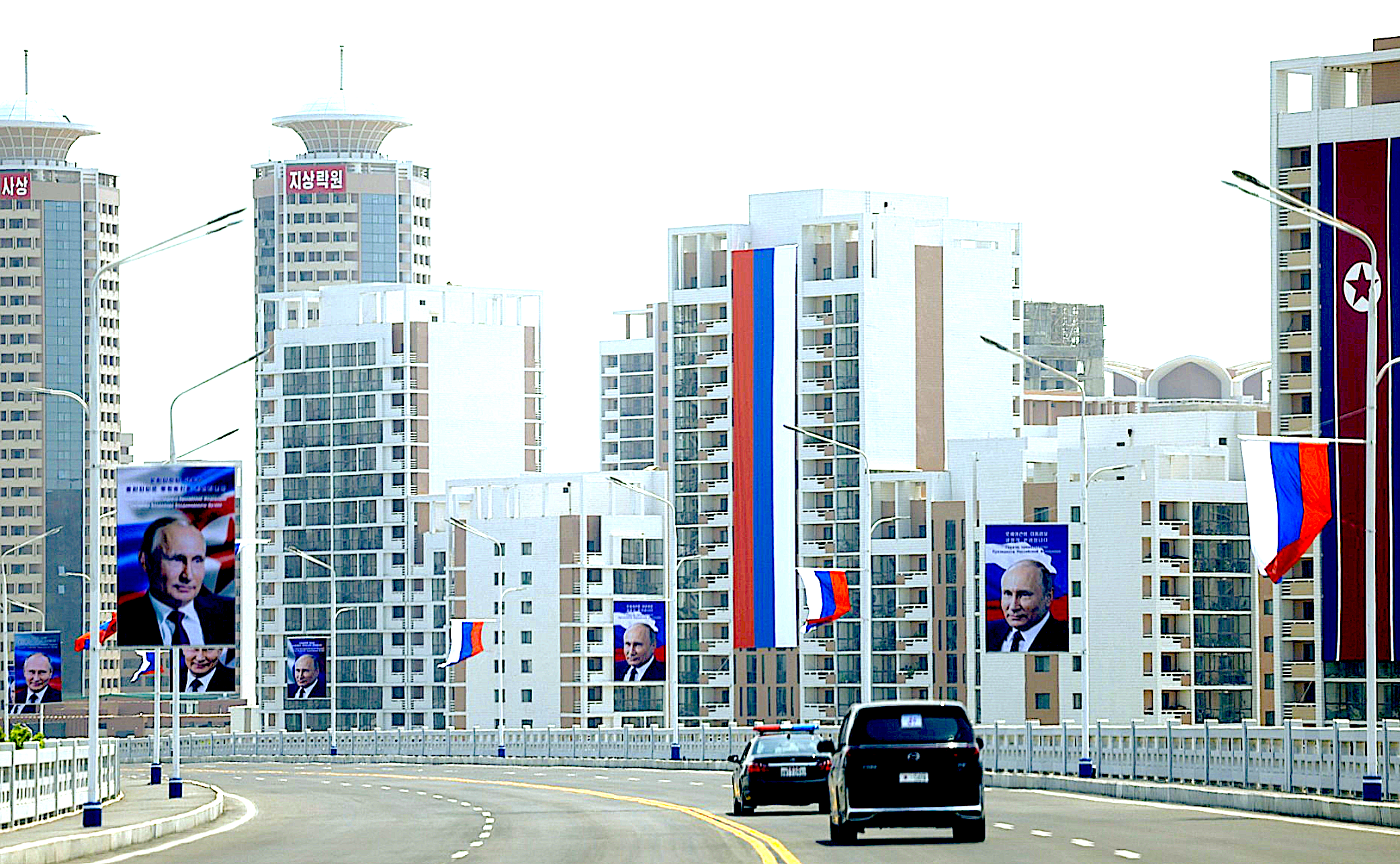
Russian President Vladimir Putin arriving in the North Korean capital Pyongyang on June 18. (President of Russia)
By Patrick Lawrence
Special to Consortium News
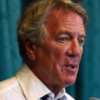 It is never a good idea to turn to corporate media for an understanding of Vladimir Putin — his thoughts, his intentions, what he does and the outcome of what he does. Whenever the Russian president is the topic, you are always going to get reports so distorted as to obscure vastly more than they reveal.
It is never a good idea to turn to corporate media for an understanding of Vladimir Putin — his thoughts, his intentions, what he does and the outcome of what he does. Whenever the Russian president is the topic, you are always going to get reports so distorted as to obscure vastly more than they reveal.
This pervasively Western–centric work makes it impossible, for anyone who relies solely on it, to see either the Russian leader or the nation he represents with any clarity, just as they are. One is invited to think Putin never acts but for the damage his chosen course will inflict on the U.S., the rest of the Atlantic world, and by extension the non–Western allies of this world.
The net effect of this unceasing exercise in misrepresentation is to place a nation of 144 million people, and most of all its leader, behind a screen similar to a Japanese shoji: It is translucent, so one can see the movements of those on the other side, but there is no making out what they are doing. They are reduced to shadows.
The consequence of this induced blindness is easily legible in the dangerous shambles the policy cliques in Washington and most of the European capitals have made of their relations with Moscow since, I would say, the winter of 2007. It was in February of that year Putin gave his famously frank speech at the Munich Security Conference, wherein he attacked the West’s “almost uncontained hyper use of force — military force, force that is plunging the world into an abyss of permanent conflicts.”
Too honest. It was inevitable that the shoji would immediately be put in place such that the man and all he did and said could thereafter be rendered illegible — grist for the propagandists.
Last week the Russian leader spent two days in Pyongyang, his first visit to North Korea since he assumed the presidency two dozen years ago. Putin then proceeded to Hanoi for his fifth journey to the Republic of Vietnam. Both visits involved nations with relations of long duration — histories dating to the decades when they stood on the same side, the anti-imperialist side, during the Cold War.
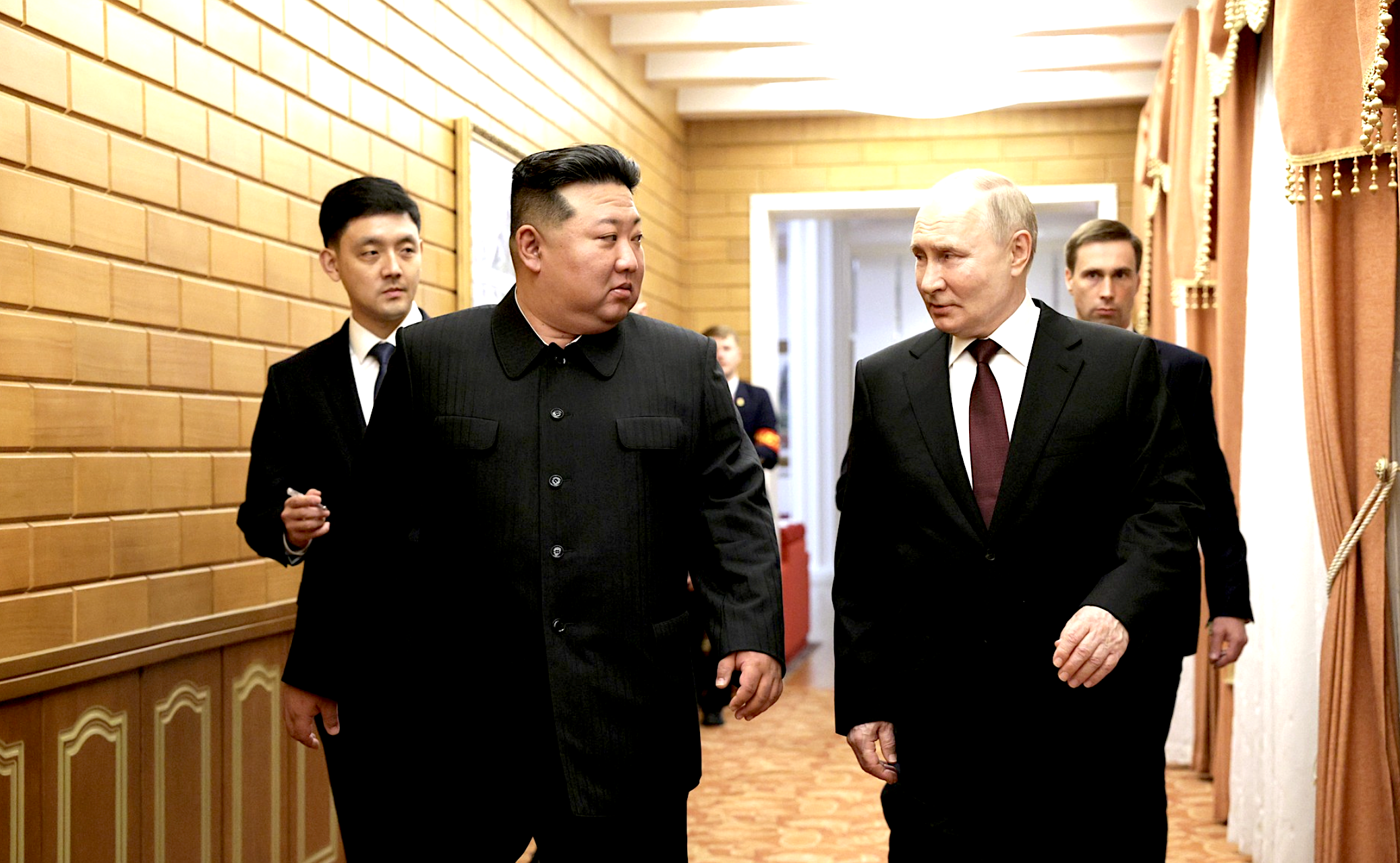
Kim Jong-un and Putin in Pyongyang last week. (President of Russia)
These were consequential occasions of state, let there be no question. But there is simply no way to understand what Putin and his counterparts got done, and why, via the West’s corporate and state-supported media. To them Putin’s intent was all about overcoming the isolation Russia suffers except that it doesn’t, destabilizing East Asia, and — a curious phrase from The New York Times coverage — “leaving behind a redrawn map of risk in Asia.”
I would ask where corporate journalists get this stuff, but the answer is perfectly clear when one considers the lockstep uniformity of the coverage: This is what reporters in Washington and correspondents abroad are fed by unnamed briefers from Langley, embassies in East Asia, and elsewhere in the national-security state’s sprawling propaganda apparatus.
Partnership With Pyongang
Putin’s talks with Kim Jong-un in Pyongyang resulted in all sorts of agreements covering the economic, technology, trade, investment and cultural spheres. But the main event was the conclusion of a “comprehensive partnership agreement” — Putin’s description — that amounts to a mutual defense treaty. Curiously, the formal name of this document is the Comprehensive Strategic Partnership Treaty. Unclear why Putin omitted so significant a term, as a strategic partnership is a half-step shy of an alliance.
Please Donate to the
Spring Fund Drive!
Accords of this kind between Moscow and Pyongyang have a long history, true. But to mark this down as a reflexive Cold War revival, as Western media have done, is a misreading one must mark down as intentional. The immediate antecedent is the Treaty of Friendship Putin signed with Jong-un’s pop, Jong-il, in 2000, just as he, Putin, was replacing Boris Yeltsin in in the Kremlin.
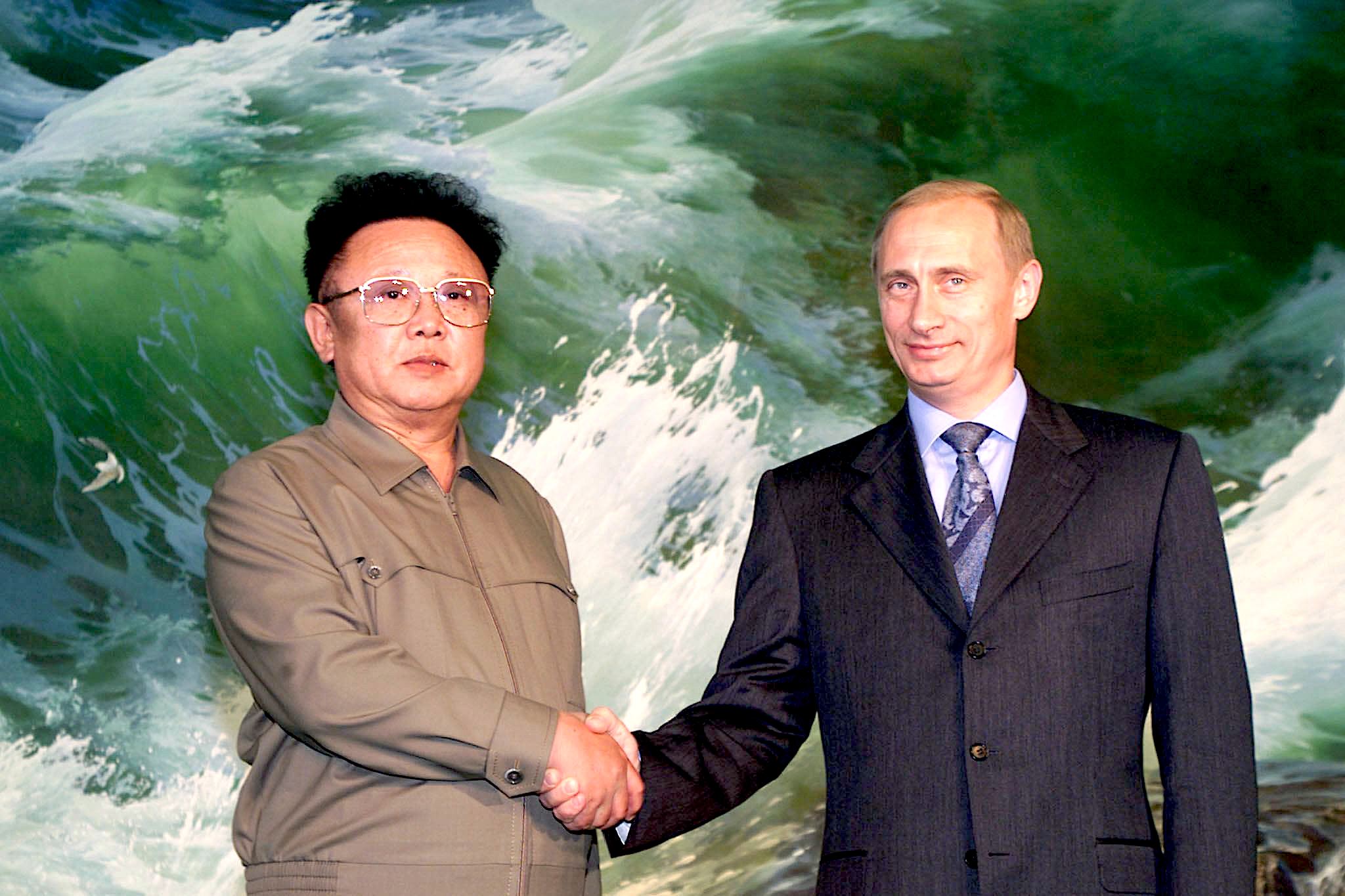
Kim Jong-il and Putin in Pyongyang on July, 19, 2000. (Kremlin.ru, Wikimedia Commons, CC BY 4.0)
I read this in simple terms that have nothing to do with what goes on in Kim’s socialist paradise. Putin is nothing if not a sophisticated statesman, and the agreement reached last week, as with the friendship treaty 24 years ago, is about long-term geopolitics: As the Munich speech made perfectly clear, the Russian leader is well aware of the hostilities that lurk beyond the Russian Federation’s borders, and the new accord is part of his effort to cover the Russian Far East’s Pacific flank.
On the military side, the Western press and those who spoon-feed it must make up their minds whether Russia needs North Korean arms as it presses its intervention in Ukraine, as long reported, or whether North Korea is now happy that it will receive supplies of Russian military technology — as is now reported. They’ll get the story straight some day, I’m sure.
Be this matter as it is, Pyongyang’s support for the Russian intervention was a very explicit topic. Both leaders mentioned it prominently. And Putin’s rhetoric was every bit as rigorous as it was in Munich 14 years ago.
“We highly value your consistent and unwavering support for Russian policy, including in relation to Ukraine,” Putin remarked when he and Kim faced the press after their talks.
“I am referring to our struggle against the hegemonistic and imperialist policy towards the Russian Federation, which the United States and its satellite states have been dictating for decades.”
This is another of the costs the West must pay for its relentless assertions of its lapsing global supremacy. Putin now seems to bless, if implicitly, Pyongyang’s development of its nuclear arsenal, whereas previously he appeared to favor a denuclearized Korean Peninsula. I have never embraced the concept of nuclear deterrence, because the need for it is always regrettable, in my view. But there are circumstances, as Putin knows firsthand now, when it is best to maintain it.
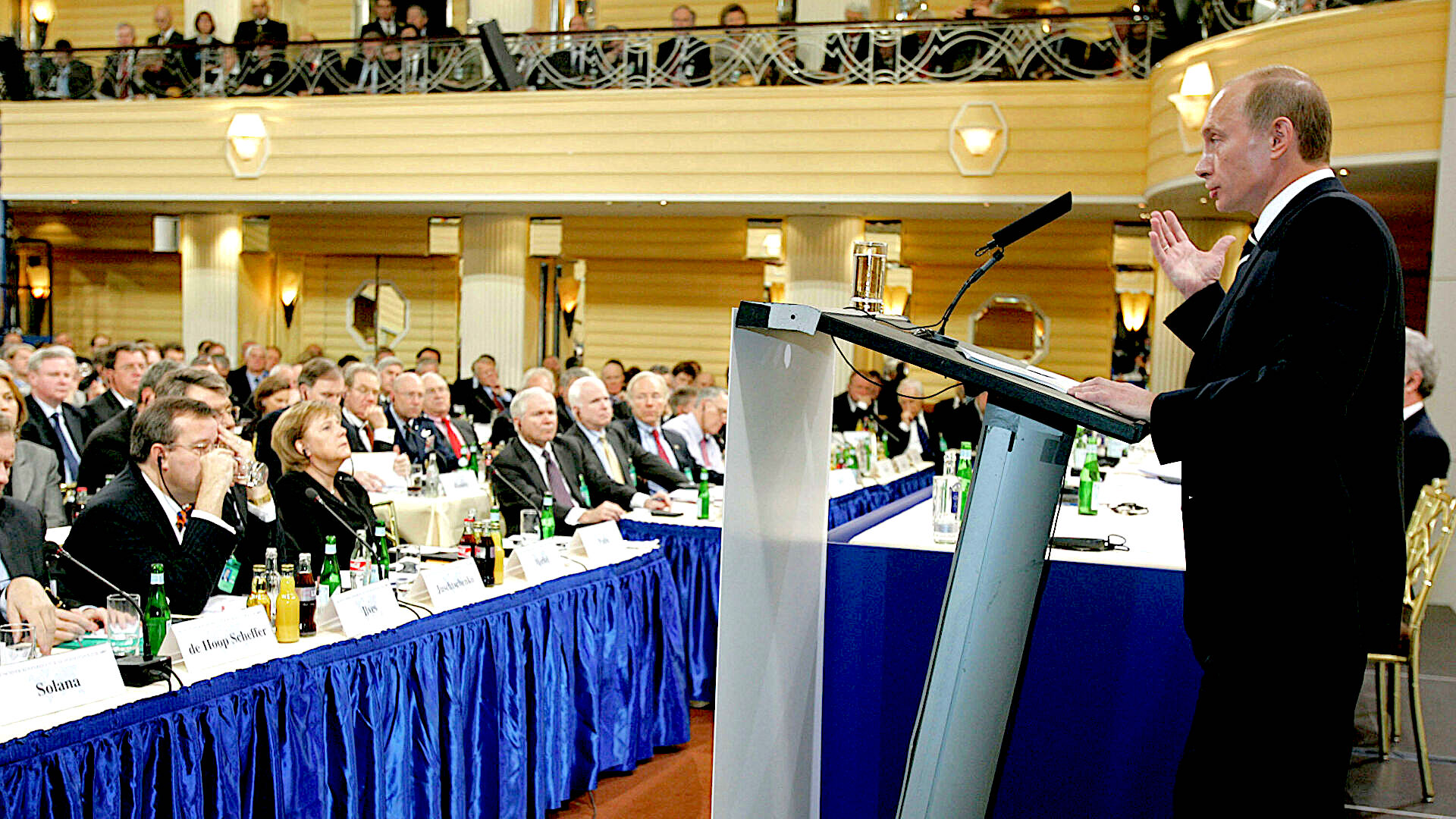
Putin addressing the Munich Security Conference in 2007. (Kremlin.ru, Wikimedia Commons, CC BY 4.0)
On to Hanoi, where Putin’s had meetings with President To Lam and other top Vietnamese officials, high among them Pham Minh Chinh, the prime minister; Nguyen Phu Trong, general secretary of the governing party’s central committee, and Tran Thanh Man, who heads the national Assembly. The tone was markedly different, which is no surprise. Hanoi does not have dangerously adversarial relations with the West of the sort Moscow and Pyongyang share, and it is not subject to Washington’s arduous campaigns to isolate it. Vietnam, in short, is the courted, not the confronted.
All sorts of agreements were signed, a dozen or more in all, covering a variety of “soft” spheres — higher education and science, customs, state investment funds, the construction of a nuclear science and technology center. I was interested to see PetroVietnam bring Russia’s Novtek into the development of an oil exploration block in the South China Sea — but on Vietnam’s continental shelf, which leaves Block 11–2 clear of long-running disputes with China and other nations concerning maritime sovereignty in the South China Sea.
Partnership With Hanoi
The big item taken up during Putin’s two days in Hanoi was, paradoxically, also perfectly routine. This was “further developing their comprehensive strategic partnership” — the same language used to name the renovated relationship between Pyongyang and Moscow.
In this connection, Putin made remarks in Hanoi I take to be the most interesting of his four-day journey. “Developing a reliable security architecture” is an aspiration “of special importance in Russia-Vietnam relations, he said to his Vietnamese counterparts, and he then went on to qualify his meaning: It must not be based on the use of force and there can be no place in it for “closed military-political blocs.” I draw here from a TASS report last Thursday, and another carried in Dawn, the Pakistani daily, the next day.
This is astute statecraft in the context of talks with the Vietnamese. For one thing, Moscow has been pressing the West for a new security architecture in just this language for more than three decades to no avail. If I read Putin correctly, he has just signaled Russia’s intent to build it to the fullest extent possible in a non–Western context.
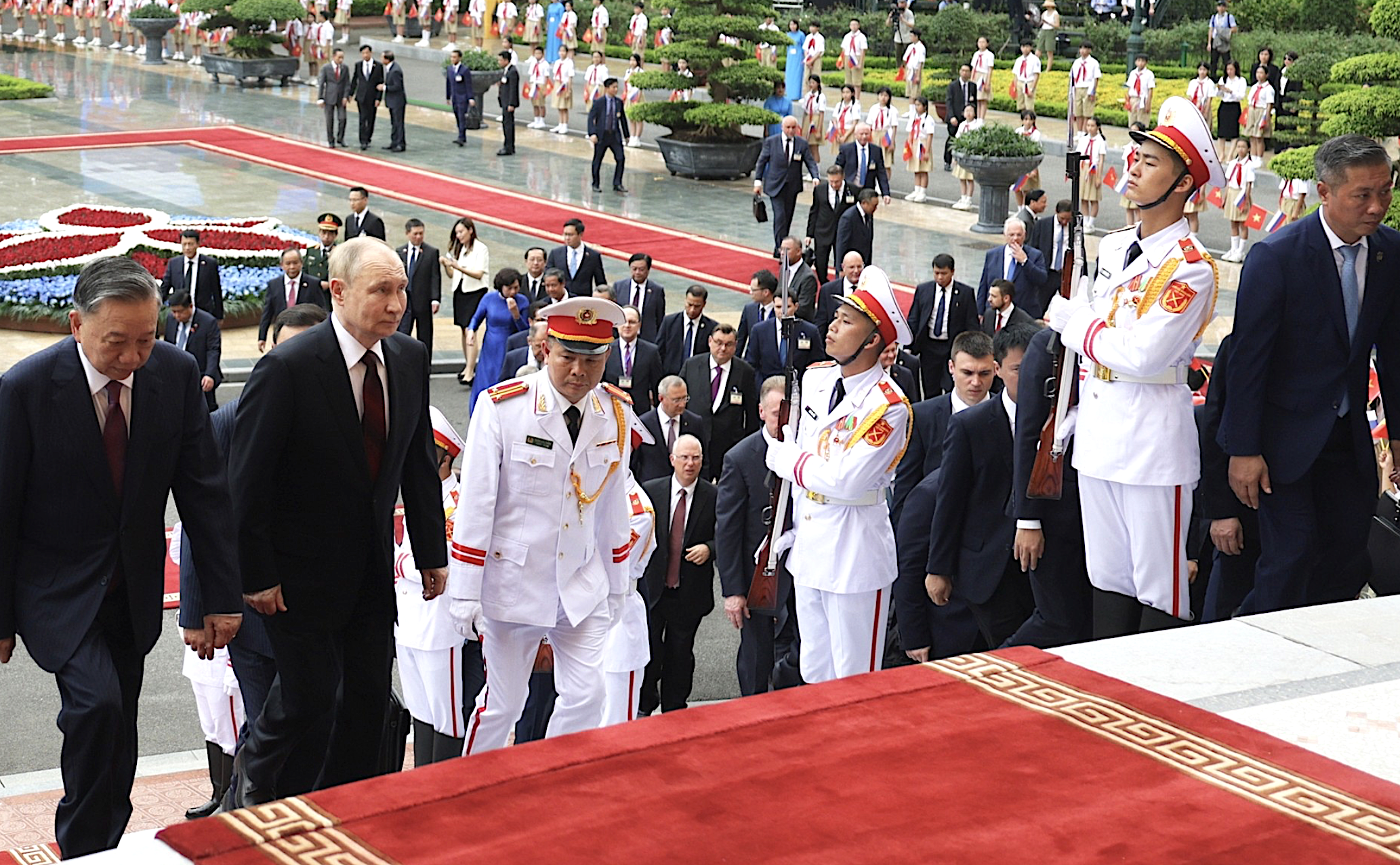
To Lam and Putin, at left, during the Russian leader’s arrival in Hanoi on June 20. (Vladimir Smirnov, TASS)
For another, Washington has been pestering Hanoi for years to enter upon just such a bloc as it, the U.S., attempts to recruit East Asians into an anti–China alliance. Neither the Biden regime nor any of its successors will ever sell the Vietnamese on this point.
And finally, as Putin knows very well, the Vietnamese are resolutely nonaligned in their foreign policies, in my judgment as nonnegotiably as India, where Jawaharlal Nehru, the country’s first prime minister, chiseled this principle in stone in the mid–1950s. Since nonalignment is a policy reference the Americans have never accepted or coped with, from Nehru’s time to ours, Putin’s renunciation of blocs will have shown him up well in Hanoi last week.
For a catalogue of all that is diabolic in these two diplomatic demarches, none has done better than Damien Cave, who published “Putin Came to Asia to Disrupt, and He Succeeded” in Saturday’s editions of The New York Times. Putin — very purposefully, we are to understand — “injected more potential threats into a region already strained by Taiwan tensions and South China Sea clashes.”
And when he was done with this malign project he went on to “undermine Beijing and rattle a collection of Indo–Pacific nations already scrambling to cope with a jumbled world order.”
Wow. This is a rare concentration of fallacies packed into a headline, a subhead and a few paragraphs. Times correspondents typically spread this dismal quality of dictated junk evenly through pieces that have at least a tenuous relationship with reality.
Shoji Paper
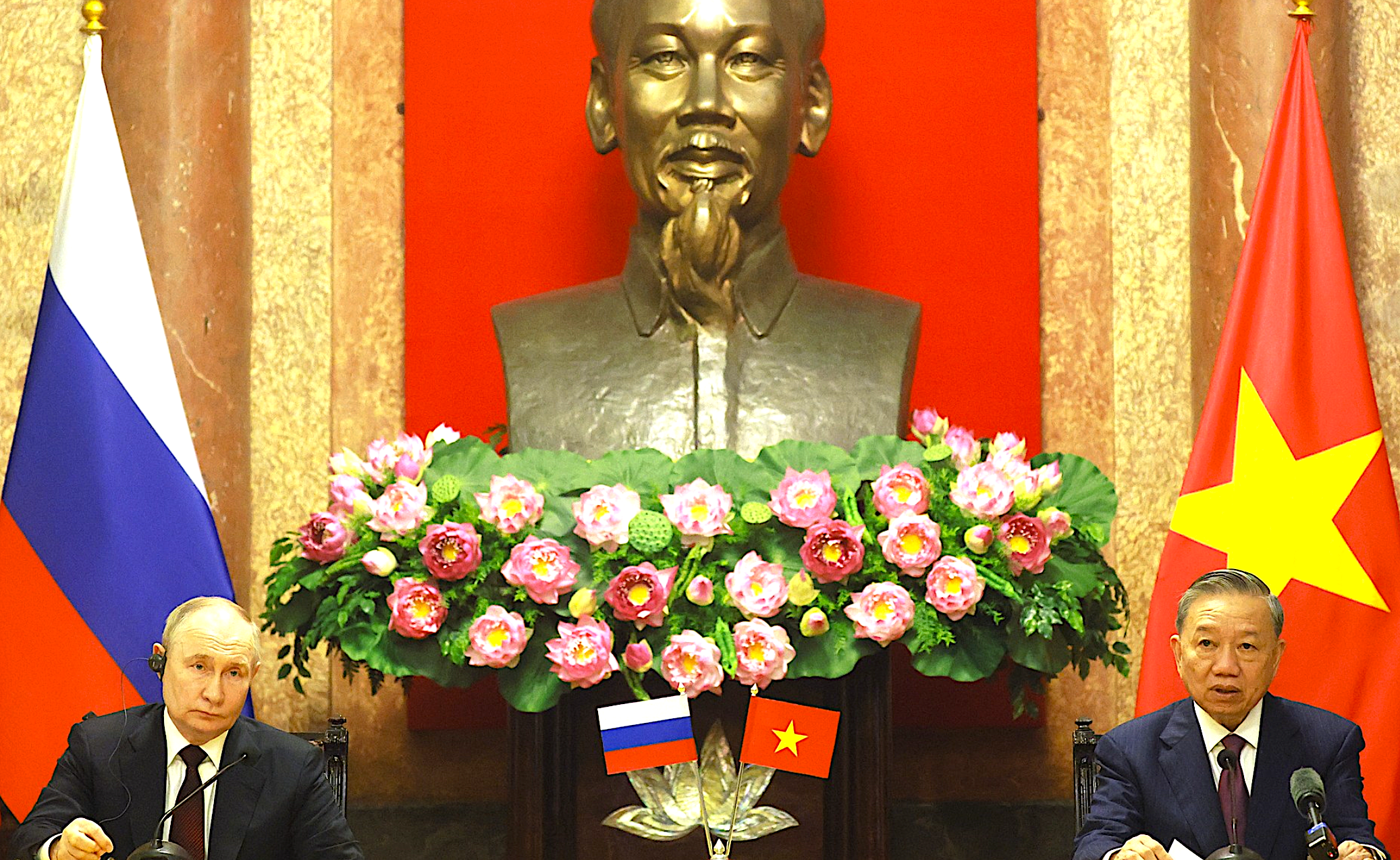
Putin and To Lam’s statements to the media on June 20. (Vladimir Smirnov, TASS)
Review the readouts and tell me you find any evidence of Putin threatening anyone with anything. The Russian leader undermined China, with whom he has cultivated an exceedingly important partnership that falls just short of an alliance? How this, I would love to know.
There being no rest for the devil, Putin gave Asia “a redrawn of risk,” as previously noted, and “suddenly empowered North Korea.” He has rattled some collection of East and South Asian nations, has he? It would be a fine thing if Cave quoted a high official from even one of these rattled nations, but no.
For the obligatory quotations, Cave goes to Rahm Emmanuel, the Biden regime’s ambassador to Tokyo; Samuel Greene, a Russianist at King’s College London; Derek Grossman, a defense analyst at RAND, and Nguyen The Phuong, a professor at the University of New South Wales in Australia.
Not a single Asian official to tell us just one thing about how Asians think of these matters.
The Times has been pulling this stunt as long as I have been reading the paper: Send a correspondent to Kinshasa or Rio or Tokyo, and then he or she makes a habit of calling people in Washington or Canberra or London to tell readers all about what’s what in Kinshasa, etc.
This is the rice paper of which the translucent shoji is made. You are supposed to think you have just read a report about events in this or that region, but you have read only how the imperium and its appendages want said events to be depicted in the media they more or less control.
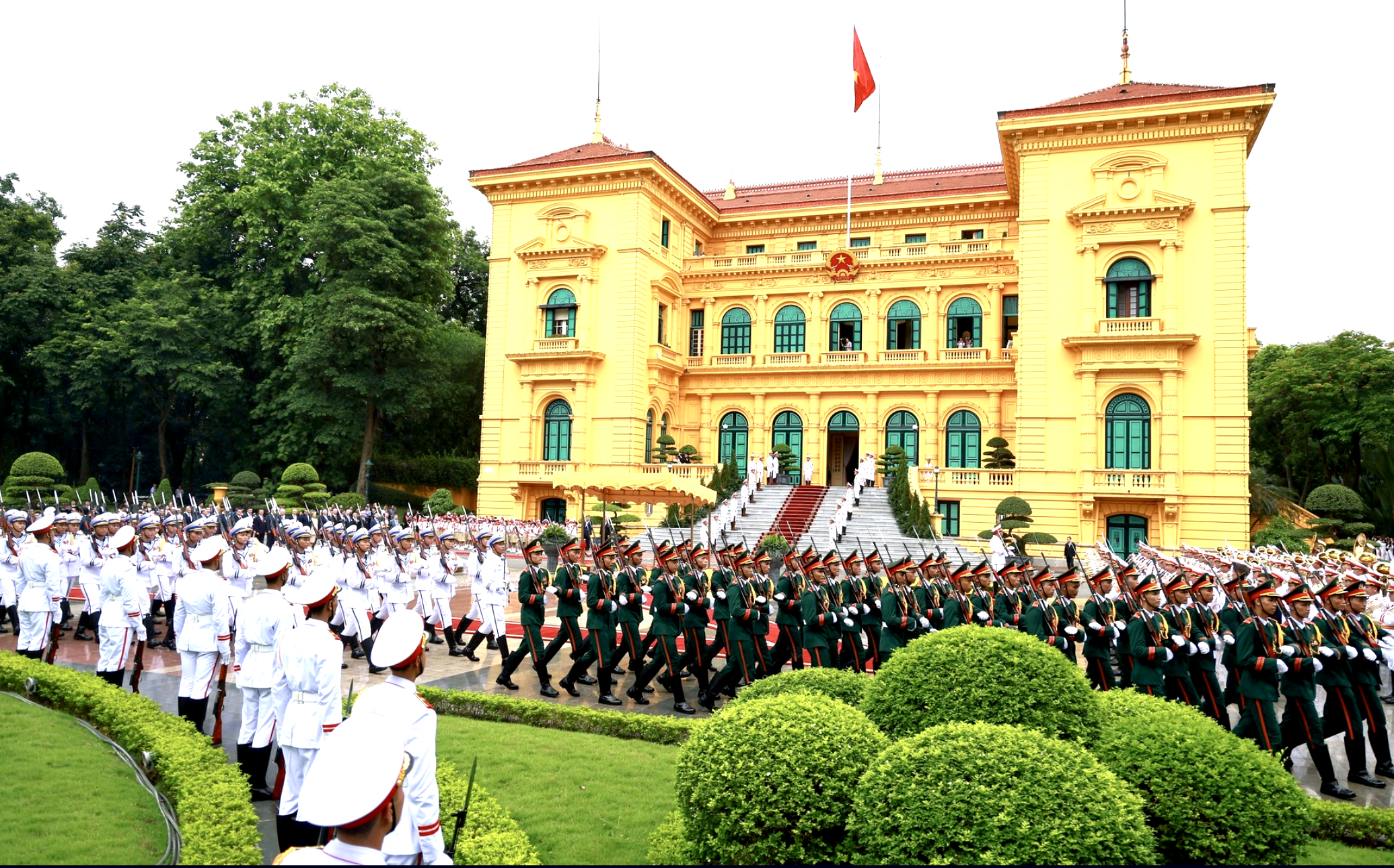
Hanoi last week during Putin’s arrival. (Vladimir Smirnov, TASS)
My fav in this line is Cave’s other source, a former Australian diplomat — Cave is based in Sydney — named Peter Tesch. From him we learn that Putin “favors keeping the world chaotic because he believes Russia benefits from keeping other countries off-kilter.”
And let us not omit this acute insight, also from Tesch:
“He’s quite happy for Russia to be the smelliest, farting uncle at the barbecue. The signal is, ‘Yes, I am a disrupter. I can act in ways that increase the complexity of what you’re trying to manage.’”
Yes, it is true, one has to admire the Australian foreign service for its subtleties. Throw another shrimp on the barbie, will you, ambassador?
Disruptive, Putin is disruptive? Putin has disrupted, and not at all comprehensively, but one thing: the designs of the imperium and its appendages to continue projecting hegemonic power at the western end of the Pacific.
Putin has suddenly empowered North Korea? Where is the “suddenly” in this and where the empowerment? Kim Jong-un has been facing down the U.S. all on his own since his much-remarked New Year’s speech in 2018, during which he stunned Washington by declaring, “North Korea has finally realized the great historic cause of completing the state nuclear force.”
The North going nuke was, of course, the predictable consequence of the abject unseriousness of Washington’s policy toward Pyongyang for decades. This has been the upside-down source of North Korea’s empowerment.
Putin seeks chaos, Russia benefits from it? As Putin, the Chinese and other non–Western leaders have made perfectly plain for years, their project is a new world order in response to the chaos the Western powers have authored — because it is to their advantage — in Asia and elsewhere.
I do not see how the Russian leader could have been any clearer on this point during his four-day swing through Asia.
I do not see disruption in Putin’s state visits so much as continuity — decades of it. I see his time in Pyongyang and Hanoi as clear, tangible evidence of Moscow’s decision to turn away from the West, to give up on working with it, just as Sergei Lavrov, Putin’s foreign minister, announced at the start of the year.
It is about the autonomy of the non–West now as it builds a new order, a thought threaded through various of Putin’s formal remarks and press conferences during his journey Eastward.
The work of the Damien Caves among us — and there are many, he not alone — is to hide this process from view so that we cannot see it. And when it is glimpsed around the edges of the shoji, it must look frightening and various other things it is not.
Patrick Lawrence, a correspondent abroad for many years, chiefly for The International Herald Tribune, is a columnist, essayist, lecturer and author, most recently of Journalists and Their Shadows, available from Clarity Press or via Amazon. Other books include Time No Longer: Americans After the American Century. His Twitter account, @thefloutist, has been permanently censored.
TO MY READERS. Independent publications and those who write for them reach a moment that is difficult and full of promise all at once. On one hand, we assume ever greater responsibilities in the face of mainstream media’s mounting derelictions. On the other, we have found no sustaining revenue model and so must turn directly to our readers for support. I am committed to independent journalism for the duration: I see no other future for American media. But the path grows steeper, and as it does I need your help. This grows urgent now. In recognition of the commitment to independent journalism, please subscribe to The Floutist, or via my Patreon account.
The views expressed are solely those of the author and may or may not reflect those of Consortium News.
Please Donate to the
Spring Fund Drive!



A fine appraisal of Putin’s recent Asian trip. Putin has been remarkably consistent ever since he assumed power and his actions are realistic & logical both strategically and in terms of Russian interests. In fact he seems like the only adult in the room when compared to the delusionary morons masquerading as the West’s “leaders”.
Western corporate media “presstitutes” can all sing from the same song sheet. And the West’s political class can continue to ignore & suppress the truth about Ukraine, Gaza or any other important foreign policy issue (dissent, after all, gets one smeared as a “far-right extremist”, “conspiracy theorist” or “Kremlin stooge”). But endless posturing & repetitive propaganda does not alter reality. Most countries across the rest of the world are choosing to cut themselves loose from the Western financial system and pursue alternative economic & security arrangements. It’s not hard to guess which side will wither on the vine.
We’ve never acknowledged Russia probably won WWII for the Allies, then used them as convenient goats to increase our military spending during the aftermath. That is, the Cold War.
When the USSR collapsed we had a chance to slack off and enjoy a “peace dividend”, remember that? Instead we increased our military budget proving that the “Russian Peril” was aways hoax. We were only after power all along.
The Empire declines and there’s nothing to be done. It has momentum.
I look forward to multipolar powers; being #1 is a pain in the backsides. Expensive , too.
a very serious essay of many obviously invaluable insights well worthy of keeping
Excellent, truthful, article! Well written and explicit, too. Thank you. God bless you.
Very, Very good work, Patrick! [I ca see why you are “censored”.]
Thanks to Patrick for such a comprehensive understandable and thoughtful contribution to our knowledge. Anyone who reads Western media when so much truth can be found by using internet sensibly is avoiding the chance of being informed.
This is detrimental to everyone
Where else would I get this straight look into what is actually happening in the world, and especially in what is supposed to be the “enemy” camp. Lifting the shoji screen to what is. Lessons in propaganda which without the truth seriously poisons our minds and manipulates our emotions. Making us participants in unknowingly cutting ourselves off at the knees with nothing but fictions to hobble about on. Thank you!
Russians were under zero moral or legal obligation to do nothing while USA turned Ukraine into a NATO bulwark on Russia’s strategic north Black Sea security zone.
Americans are waking up to the fact that they’ll have to bleed for their imperialism once Ukraine implodes.